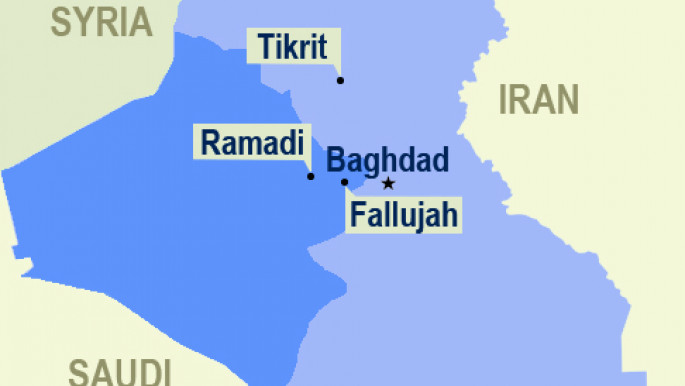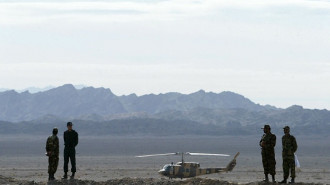Amnesty International condemns Iraq's ruling Kurdish party after shootings
Amnesty International has called for an inquiry into a spate of killings in the Kurdistan region of Iraq, some linked to militias suspected allied to the government.
Three men and two teenage boys were killed following protests outside the office of the ruling Kurdistan Democratic Party on 9 and 10 October.
"Amnesty International has today called on the Kurdistan Regional Government (KRG) authorities to rein in armed political militias and open an independent, impartial and thorough investigation into the deaths," a statement from the group read.
The usually quiet Kurdistan Region of Iraq has witnessed weeks of protests over the past two weeks, as hundreds of public sector workers took to the streets to demand the payment of overdue salaries.
There is also growing unrest regarding the political situation in the Kurdistan region, particularly after the KDP tried to extend President Massoud Barzani's term in office, which ended 19 August.
The KDP and Patriotic Union of Kurdistan jointly rule Iraq's three Kurdish provinces and allied militias are known to take the law into their own hands.
Militias from both parties have a history of committing human rights abuses with impunity, Amnesty said.
Peaceful protests took place on 9 October, outside the party's headquarters in Qaladze, Sulamaniyah governorate, until armed men in KDP militia men fired into the crowd.
A 31-year-old teacher who went into the crowd to escort his younger brother home was killed by the gunmen.
Police arrived hours later to transport the militia men away. At least two people died and 20 protesters were injured in the shootings that night.
In retaliation, a group of protesters set fire the KDP headquarters in Qaladze on 10 October, with the body of a 13-year-old boy recovered from the scene, although the circumstances in which the boy ended up in the office are not clear.
Militias
On the same day, protests in the town of Kalar, Kirkuk, took place outside the local KDP office. Stones were thrown and the buildings are rounds fired back.
Two men - Aram Bayiz Abid and Osman Adnan Muhammed - were killed in the protest, and 19 injured, according to local media.
The KDP said that Muhammed was a party official and killed in a "hail of bullets" fired by the protesters, while Abid was shot dead "by a stray bullet".
However, Amnesty International received reports that the two men were killed by three unidentified gunmen during a drive-by shooting.
On 15 October, the KDP said that 400 people were arrested in connection with the burning of the party's headquarters.
Amnesty has called for a prompt and investigation into the all the deaths on 9 and 10 October, including non-KDP members.
It also called for authorities to "rein in armed political party militias and ensure that everyone can exercise their right to peaceful assembly without fear of attack".
Iraqi unity
In a bid to capitalise on some recent battle successes in Iraq, Baghdad leaders told a top US general Tuesday that they will move to improve coordination between the country's disparate and sometimes warring factions battling Islamic State group militants.
General Joseph Dunford, chairman of the Joint Chiefs of Staff, said Prime Minister Haider al-Abadi and Defence Minister Khaled al-Obeidi agreed to begin talks Wednesday with US leaders on selecting a single commander who can speak for all the groups when trying to coordinate missions with the US-led coalition.
The move, he said, will allow the Iraqi security forces, the Kurdish government forces known as the Peshmerga, the Sunni tribes and the popular mobilisation troops to work better together.
"We need somebody who is empowered by you to make decisions and work with us, so we can provide support across all Iraqi forces," Dunford said he told them, adding that a fundamental principle of commanding and controlling forces is "wherever two or more are gathered, one must be in charge".
Dunford travelled to Iraq Tuesday in the last segment of a five-day trip, which also included stops in Israel and Jordan.
It was his first trip to the war zone since taking the chairman's job on 1 October, and he spent time meeting with military commanders and leaders of the Kurdish government in northern Iraq in the morning, then went to Baghdad.
Speaking to reporters traveling with him, Dunford offered a somewhat upbeat assessment of the situation in Iraq.
Dunford said he is asking his top advisers and commanders to come up with recommendations on how the US-led coalition can motivate the Iraqi forces, seize the opportunities presented by the recent successes in Baiji and Ramadi, and pick up the pace of operations.
He didn't provide specifics, but said some of it could include additional training, more equipment or improving how the coalition is doing things.
Dunford added that the US is trying to get an operations centre set up in northern Iraq that would allow the Iraqi security forces and the Peshmerga to coordinate operations better.
The US-led coalition began airstrikes in Iraq more than a year ago, after Islamic State group insurgents swept across the country, taking over large sections of its west and north.
Much of the Iraqi Army collapsed, with troops fleeing or joining the militants.
Since then, the battle to take back the lost ground has stuttered and stalled.
"Three or four weeks ago, there was no movement at all around Ramadi, no movement toward Baiji," said Dunford.
"Now we see more movement than we've seen before, movement that I think we can take a look at and say, 'OK, how do we reinforce success now?'"
 |
Baiji
Late last week Iraqi troops backed by Shia militia fighters drove IS militants out of the Baiji oil refinery, which has been contested for months.
According to US Maj. Mike Filanowski, an intelligence officer with the military's joint task force in Baghdad, Iraq's special operations troops were key to securing the refinery's perimeter and the power plant to the north.
They are now slowly moving toward the centre of the refinery, clearing enemy fighters.
Mosul and Ramadi, the capital of Iraq's western province of Anbar, are both under IS control, and efforts to retake them have been problem-plagued.
Earlier this month, however, US officials said Iraqi ground forces advanced to the outer suburbs of Ramadi and said conditions may soon be right to launch an assault to take back the city.
Dunford, however, was also frank about the challenges ahead, and warned that he will not be talking about any specific timelines for the Iraq campaign.
Better integrating the Iraq forces will be one challenge, but others include building up the Syrian rebel forces to fight IS, getting additional needed equipment and ammunition to the Kurds in northern Iraq and encouraging the Iraq government to be more inclusive and live up to its commitments to the Sunni tribal fighters.
"A year ago, ISIL [IS] was making progress unchecked," said Dunford, using an acronym for Islamic State. "So, I'm not trying to put lipstick on a pig here. I'm trying to be honest about where we are. The momentum of ISIL was stopped, they have lost ground."
Dunford's stop in Iraq comes after three days of meetings with senior military and government leaders in Israel and Jordan, two key US allies in the region.
In both countries, Dunford heard officials' concerns about the Islamic State group threat and the roiling instability in the region.

![Palestinians mourned the victims of an Israeli strike on Deir al-Balah [Getty]](/sites/default/files/styles/image_684x385/public/2024-11/GettyImages-2182362043.jpg?h=199d8c1f&itok=xSHZFbmc)


![The law could be enforced against teachers without prior notice [Getty]](/sites/default/files/styles/image_684x385/public/2178740715.jpeg?h=a5f2f23a&itok=hnqrCS4x)
 Follow the Middle East's top stories in English at The New Arab on Google News
Follow the Middle East's top stories in English at The New Arab on Google News
![Fakhrizadeh [AFP] Fakhrizadeh [AFP]](/sites/default/files/styles/image_330x185/public/media/images/774C39F7-8F7A-4D67-B998-27D102FCB4A7.png?h=d1cb525d&itok=j9eGvunV)

